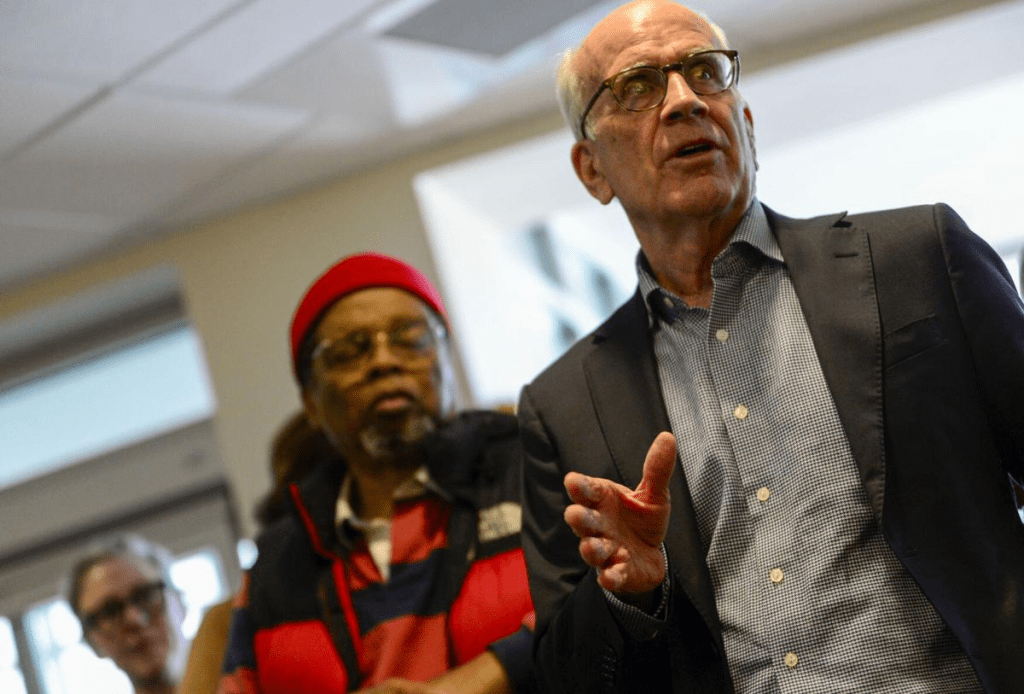
Kristopher Radder Brattleboro Reformer
BRATTLEBORO — U.S. Sen. Peter Welch, D-Vt., stopped in to visit the folks at Brattleboro Memorial Hospital on Wednesday afternoon and thank them for all their hard work.
“We are right now in challenging times in this country,” he said to about 45 people in the lobby of the Medicare-dependent hospital who are concerned what cuts to the federal budget might mean to BMH’s commitment to the community.
“We don’t pick the times we’re in, we just decide how we’re going to live and how we’re going to engage,” said Welch. “You have to make this hospital run efficiently. You have to support one another in doing your work. You have to train new people to do the work. You have to deal with the emotional anxiety that so many of our fellow citizens feel about what’s going on in the world now … they come in with a health issue where the anxiety is increased, and you have to be able to help them have some confidence that they’ll get through it. That is hard, every-single-day work [and] I just have to express to you my gratitude.”
Chris Dougherty, president and CEO of Brattleboro Memorial Hospital, thanked Welch for advocating for rural hospitals, especially those like BMH that can’t operated without funding from the federal government, which he called “a lifeline.”
“We can’t be the lifeline to this community without people like you fighting to give us this lifeline to Medicare-dependent hospitals,” he said. “This is a national issue that is very acute here, and right here in Vermont.”
Dougherty noted that BMH receives about $3 million year in federal funding, which covers the needs of about 20 percent of BMH’s patients.
Welch said the $4.7 trillion tax cut proposed by the current administration requires an $880 billion cut from Medicaid. He said such a proposal threatens rural health care across the country.
“If they don’t have health care, they’re going to still show up here,” said Welch. “You’re going to take care of them. But then, you won’t get paid. It’s totally unconscionable and totally unnecessary, and we’re going to fight tooth and nail …”
Welch said he and the rest of the Vermont delegation — Sen. Bernie Sanders, I, and Rep. Becca Balint, D — will continue to fight for rural hospitals and remind their red-state colleagues there is as much on the line for their constituents as the folks in Vermont.
“It’s a real reflection of values, where you’re literally taking health care away from communities, individuals, seniors, kids … It’s a very serious profound moment for our country, because we we simply can’t make that decision to abandon health care in exchange for tax cuts.”
Welch also pointed out that the main beneficiaries of the $4.7 trillion tax cut are billionaires.
Despite the challenges in Washington, D.C., Welch is confident they can save health care in the United States, because Republican senators have constituents with the same issues.
“The people they represent have the same connection to Medicaid as the people in Vermont,” he said. “These are not Red State/Blue State situations. These are working class concerns.”
Medicare is a federal health insurance program for people age 65 or older. Medicaid is a joint federal and state program that provides health coverage for low-income individuals and families.
Of the 72 million Americans who rely on Medicaid, 157,000 of them live in Vermont. Medicaid also pays for nearly half of all births in the U.S., covers nearly half of all of America’s children, and provides care to two of three nursing home residents and 17 million women of reproductive age.
Welch and Sen. Chuck Grassley, R-Iowa, recently introduced the bipartisan Rural Hospital Support Act, legislation to prevent rural hospital closures by extending and modernizing critical Medicare programs. The bill would permanently extend the Medicare-Dependent Hospital program to ensure eligible rural hospitals are reimbursed for their costs. The bill would also permanently extend the Low-Volume Hospital program to level the playing field for rural hospitals whose operating costs often outpace their revenue.
“I so appreciate you hanging in with all this uncertainty, because it makes it a lot harder to do your work,” Welch told those gathered in the lobby.
Jane Baker told Welch she was distressed that the administration had cut funding to pediatric cancer research. He son had cancer when he was five and he’s now 25.
“He works here. He’s healthy. Everything is great, but I worry about the other people who are being diagnosed now. … How much longer and how much more cruelty can we accept from this president before we impeach [him]?”
Welch said he is also distressed by the cruelty of the not only the policies, but the implementation of them and the uncertainty it has generated.
“I don’t have an answer for that because it’s not a Vermont thing.”
Welch said he will work hard for the communities he represents, but it’s also up to them to keep doing the hard work and not get discouraged by politics.
Earlier in the day, Welch visited Allard Lumber, where he heard how tariffs on Canada could affect their business. He also visited G.S. Precision, where he learned about the GSP School of Manufacturing Technology.
Story Written by Bob Audette, Brattleboro Reformer
